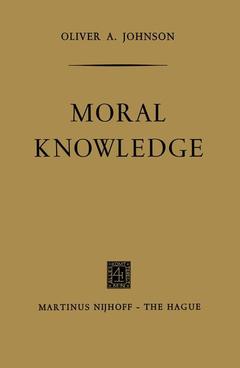Moral Knowledge, 1966
Langue : Anglais
Auteur : Johnson Oliver A.

As its title indicates, this book is concerned with two different fields of philosophy, ethics and epistemology. The bulk of the argument is devoted to epistemological questions, as these arise within the context of morality. Hence, the conclusions I reach could probably best be described as prolegomena to the elaboration of a theory of ethics. I have plans, which I hope will be realized in the next few years, of elaborating such a theory. I started work on Moral Knowledge in the summer of 1958 with the help of a University Faculty Fellowship, for which I am most grateful. of the research for the book, as well as a good bit of its writing, Much was done in two libraries, The University Library, Berkeley, and the Bodleian Library, Oxford. Members of the staffs of both libraries, by their courtesy and helpfulness, lightened immeasurably the task of my research. lowe a special debt of gratitude to four people-to Mr.
I. The Problem of Moral Knowledge.- 1. Contemporary sources of moral skepticism.- 2. Hume and the deductive fallacy.- 3. The meaning of moral obligation.- 4. The criteria of knowledge.- 5. Plan of the book.- II. Duty and Goodness.- 1. Types of theory.- 2. The deontologists’ critique of utilitarianism.- 3. Intuitionistic utilitarianism as a theory of moral knowledge.- 4. The identification of goodness and duty.- 5. The “ought-to-be” argument.- 6. The deductive argument-a restatement.- 7. The appeal to self-evidence.- 8. Reductionistic utilitarianism.- 9. Moral goodness and duty.- 10. Duty and goodness and the “ought” and the “is”.- III. Duty and Rightness.- 1. The intuitionism of the deontologists.- 2. Prichard’s “unreasonable” theory.- 3. The self-evidence of our duties.- 4. The duty to keep promises.- 5. Intuition and generalization.- 6. Rightness and duty.- 7. From rightness to duty.- IV. A New Point of View.- 1. Oxford philosophy.- 2. The revolution in philosophy.- 3. Wittgenstein.- 4. Analysis and moral philosophy.- 5. Analysis and the problem of moral knowledge.- V. Duty and Ordinary Language.- 1. An interpretation of Toulmin’s conclusions.- 2. A reinterpretation of Toulmin’s conclusions.- 3. Good reasons and generally accepted reasons.- 4. Toulmin’s theory and the deductive fallacy.- 5. Does Toulmin escape the deductive fallacy?.- 6. Summary comments on Toulmin’s moral theory.- 7. Nowell-Smith and the problem of moral knowledge.- 8. Wittgenstein and the revolution in philosophy.- VI. A Return to Intuitionism.- 1. The deductive fallacy, skepticism, and intuitionism.- 2. A defense of intuitionism.- 3. Knowledge and a plurality of intuitions.- 4. Intuitive self-evidence and moral knowledge.- VII. Reason and Duty.- 1. Two notions ofself-evidence.- 2. Preliminary objections.- 3. Duty and good reasons.- 4. A moral axiom.- 5. A story.- 6. Elaboration and comments.- 7. The principle of personal impartiality.- 8. Egoism and morality.- 9. The deductive fallacy.- VIII. Toward a General Theory of Morality.- 1. Outline of a positive theory of obligation.- 2. Practical qualifications.- 3. Morality and utility.- 4. Goodness and the naturalistic fallacy.
Date de parution : 01-1966
Ouvrage de 172 p.
15.5x23.5 cm
Mots-clés :
David Hume; Ludwig Wittgenstein; Utilitarianism; knowledge; morality; reason
© 2024 LAVOISIER S.A.S.



